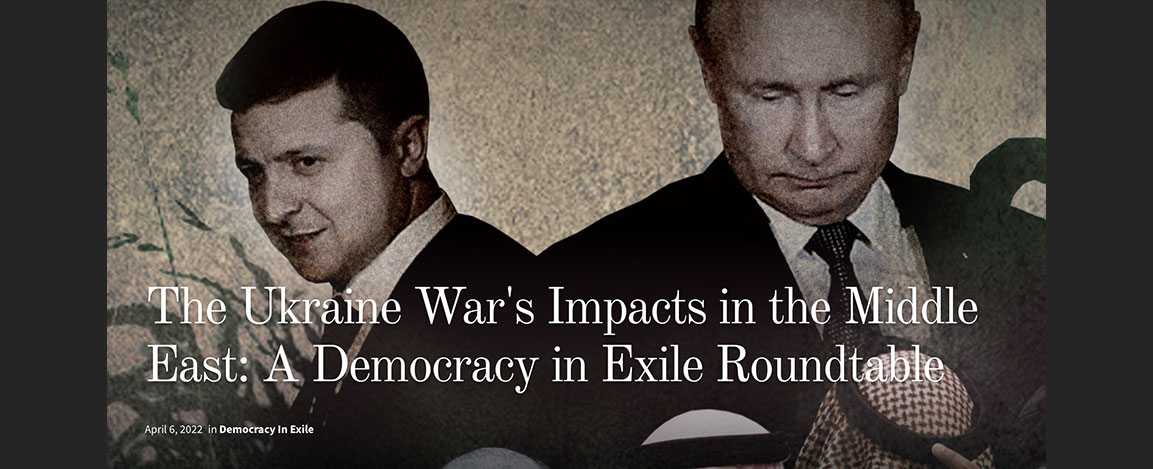John Tirman is coauthor of the Republics of Myth: National Narratives and the US-Iran Conflict, and the executive director of the MIT Center for International Studies. He is also a non-resident fellow at DAWN. This article appeared first here in Democracy in Exile, the DAWN journal.
One surprising aspect of the US-Russia relationship is how certain joint activities survived more general hostility, at least before Russia's invasion of Ukraine. One of those activities was diplomacy on the Iran nuclear program and efforts to restrain it, namely, the Joint Comprehensive Plan of Action, or JCPOA, the nuclear deal signed in 2015 from which Trump withdrew in 2018.
The negotiations to revive the JCPOA did suddenly become swept up in the invasion politics when the United States suggested Russia could not use trade relations with Iran—which would be enabled by lifting of certain sanctions on Iran—to circumvent sanctions resulting from its invasion and occupation of Ukraine. At issue was Russia's participation in building Iran's civilian nuclear capability, a lucrative business for Russia.
After a few days of foot stomping, the issue seemed to subside. "It has been logical to us, and should be logical to all parties, that we would not sanction Russia's participation in nuclear projects that are part of a full return to the JCPOA," said a State Department spokesperson. The issue could become relevant again if indeed Russia were to circumvent Ukraine-related sanctions.
That was not the end to how the Ukraine war affects JCPOA negotiations. Iran is now insisting that the Islamic Revolutionary Guard Corps, or IRGC, be relieved of the "foreign terrorist organization" designation imposed by Trump in 2019. It is a sanction that Trump officials still argue is a necessary obstacle to Iranian militancy in the region. It shows, they say, that the United States will stand behind sanctions that cannot be whittled away by other priorities.
Lifting the terrorist declaration has other implications. Among them are those held by powerful Gulf monarchies and Israel, all of whom see the IRGC as a deadly enemy. President Biden is trying to draw Saudi Arabia and others into the coalition against Russia, an important way to increase oil production and alleviate some of the pain felt by Americans at the gas pump. (Russian oil imports are miniscule, but sanctions on Russia do affect the global oil market.) Israel's reluctance to take sides in the Ukraine war is disappointing behavior of such a supposed ally, but it has real consequences in American politics as it exerts its considerable muscle in the halls of Congress and the news media.
And that gets to the most powerful implications of the Ukraine-Mideast entanglement: the political risks for Biden of lifting sanctions on the IRGC, or indeed on Iran generally, while calling for sanctions against Russia. Republicans and the Israel lobby are agitating against the revived JCPOA (before seeing its details) as a capitulation to Iran. This was expected, as they did this in 2015 and gave full-throated approval to Trump's actions against the nuclear deal and the Revolutionary Guards. Most vow to withdraw again if a Republican is elected president in 2024, which makes Iran believe the accord is ephemeral. And now such political opposition in the United States is braced by Biden's delicate dance in Ukraine. Polls of the American public are mixed but broadly support more action against Russia and are skeptical of Biden's war policy.
This political precariousness makes it difficult for Biden to "appease" Iran on the IRGC matter. If he does lift such sanctions, the Republicans will make a lot of noise about it, and such a commotion could have multiplier effects: The 2015 agreement, for example, led to US support for the Saudi- and UAE-led war in Yemen. Similar deleterious effects could follow a JCPOA restoration. Certainly, the Saudis, Emiratis and Israelis will see a new JCPOA as a kind of betrayal and continue to stand militantly against Iran (and continue to be unhelpful with respect to the Ukraine war).
Biden can veto just about any legislation aimed at killing the JCPOA, so the accord would be safe from Republican wrath in the next two years. But the Ukraine war definitely complicates Biden's political calculations—his appearance of weakness, according to some—at a time when he cannot afford such complications and the JCPOA may not withstand them.
—John Tirman is coauthor of Republics of Myth: National Narratives and the US-Iran Conflict, and the executive director of the MIT Center for International Studies. He is also a non-resident fellow at DAWN.




